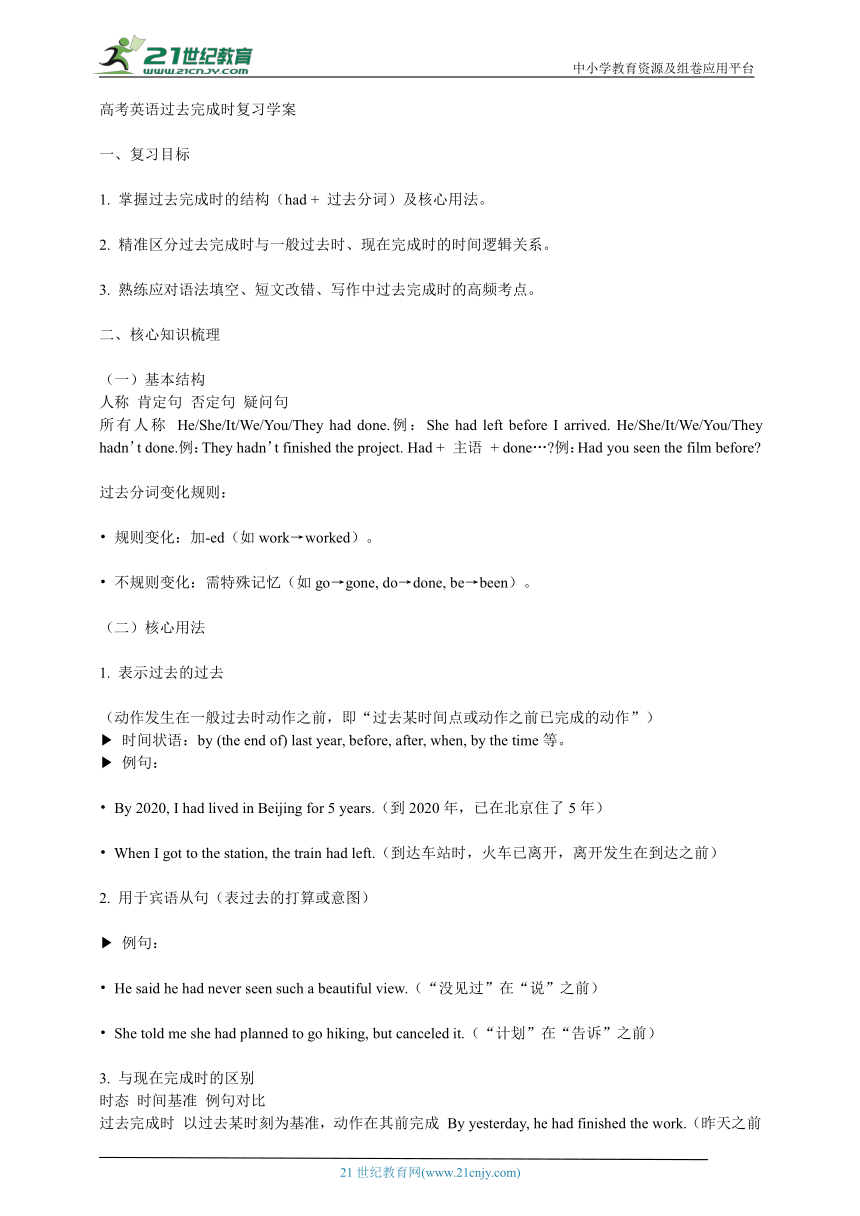
中小学教育资源及组卷应用平台 高考英语过去完成时复习学案 一、复习目标 1. 掌握过去完成时的结构(had + 过去分词)及核心用法。 2. 精准区分过去完成时与一般过去时、现在完成时的时间逻辑关系。 3. 熟练应对语法填空、短文改错、写作中过去完成时的高频考点。 二、核心知识梳理 (一)基本结构 人称 肯定句 否定句 疑问句 所有人称 He/She/It/We/You/They had done.例:She had left before I arrived. He/She/It/We/You/They hadn’t done.例:They hadn’t finished the project. Had + 主语 + done… 例:Had you seen the film before 过去分词变化规则: 规则变化:加-ed(如work→worked)。 不规则变化:需特殊记忆(如go→gone, do→done, be→been)。 (二)核心用法 1. 表示过去的过去 (动作发生在一般过去时动作之前,即“过去某时间点或动作之前已完成的动作”) 时间状语:by (the end of) last year, before, after, when, by the time等。 例句: By 2020, I had lived in Beijing for 5 years.(到2020年,已在北京住了5年) When I got to the station, the train had left.(到达车站时,火车已离开,离开发生在到达之前) 2. 用于宾语从句(表过去的打算或意图) 例句: He said he had never seen such a beautiful view.(“没见过”在“说”之前) She told me she had planned to go hiking, but canceled it.(“计划”在“告诉”之前) 3. 与现在完成时的区别 时态 时间基准 例句对比 过去完成时 以过去某时刻为基准,动作在其前完成 By yesterday, he had finished the work.(昨天之前已完成) 现在完成时 以现在为基准,动作在现在之前完成 He has finished the work now.(现在已完成) 4. 常见固定句型 Hardly had + 主语 + done…when…(一……就……) Hardly had I sat down when the phone rang.(我一坐下电话就响了) No sooner had + 主语 + done…than… No sooner had he arrived than he started working.(他一到就开始工作) (三)与一般过去时的时间逻辑 动作顺序 时态 例句 动作A(先发生)→动作B(后发生) 动作A:过去完成时动作B:一般过去时 She had eaten breakfast before she went to school.(先吃早餐,后上学) 两个动作紧接着发生(无明显先后) 均用一般过去时 He opened the door and walked in.(开门后立即走进来) 三、高频考点突破 (一)语法填空:时态判断与动词形式 解题步骤: 1. 找时间状语(如by, before, after, had hardly…when等)。 2. 分析动作先后顺序(过去完成时动作在一般过去时之前)。 3. 正确使用过去分词(尤其注意不规则变化)。 例题: 1. By the end of last term, we had learned (learn) 1000 words.(by+过去时间点,用过去完成时) 2. When I arrived (arrive) at the party, Tom had left (leave).(“到达”为过去时,“离开”在其前,用过去完成时) 3. Had she finished (finish) the report before the meeting (before提示先后顺序) (二)短文改错:时态误用与结构错误 常见错误类型: 1. 该用过去完成时却用一般过去时: 错:He went to bed after he finished his homework. 对:He went to bed after he had finished his homework.(“完成作业”在“睡觉”前) 2. 过去分词错误: 错:She had went to school before I called. 对:She had gone to school before I called.(go的过去分词为gone) 3. 时间状语与时态不匹配: 错:By now, he had left. 对:By now, he has left.(by now表“到现在”,用现在完成时) 例题: 错:After he has dinner, he watched TV. 改:After he had had dinner, he wat ... ...
~~ 您好,已阅读到文档的结尾了 ~~

